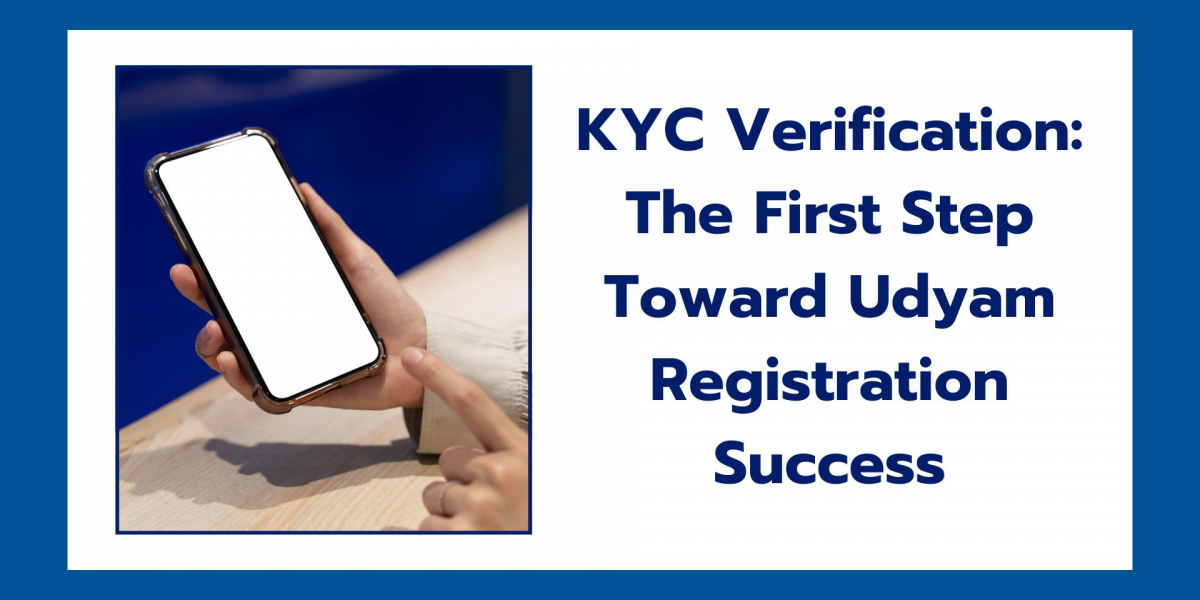Know Your Customer (KYC) is a process wherein the identity of an individual or entity is verified based on documents and information that establish legitimacy. In the context of Udyam Registration, KYC is essential because it verifies the authenticity of the business and its owners. The primary objective of KYC in Udyam Registration is to prevent fraudulent activities, including money laundering, fake identities, and the misuse of government benefits meant for legitimate MSMEs.
KYC verification typically involves submitting personal and business information such as:
Aadhaar Card (Mandatory for Udyam Registration)
PAN Card
Business Details (e.g., business name, type, address)
Bank Account Information
Ownership Documents
These details enable the authorities to cross-check and validate the legitimacy of the business and the information provided by the owner. By ensuring the completion of KYC, businesses demonstrate transparency, enhancing trust with regulators and potential stakeholders.
Why KYC is the First Step Toward Udyam Registration Success
Udyam Registration offers numerous benefits to MSMEs, including access to priority sector lending, subsidies, exemptions from direct taxes, and eligibility for government tenders. However, to avail of these benefits, businesses must first ensure that their identity is authenticated via KYC. Here’s why KYC verification is the foundation for successful Udyam Registration:
1. Eliminates Identity Fraud
Identity fraud is a significant concern when it comes to government schemes and registrations. Without proper KYC checks, there is a risk of misuse of the Udyam portal by fraudulent entities claiming MSME benefits. KYC verification ensures that the person or entity applying for Udyam Registration is legitimate, with an authentic identity that can be tracked and verified.
By completing KYC, businesses reduce the risk of identity theft, where fraudsters might attempt to gain access to benefits or loans in the name of a fake MSME.
2. Ensures Legal Compliance
KYC verification plays a crucial role in ensuring that businesses are compliant with the law. Udyam Registration is a government-mandated requirement for MSMEs, and KYC helps verify that only eligible entities are applying. Businesses that comply with KYC norms during registration avoid legal hassles and establish themselves as compliant entities in the eyes of the government. Failure to meet KYC requirements may lead to delays, rejections, or even legal consequences.
3. Facilitates Financial Inclusion
KYC is a key enabler of financial inclusion, especially for MSMEs that are often unorganized or underbanked. Through Udyam Registration, MSMEs can gain access to credit facilities, priority lending schemes, and financial subsidies. However, banks and financial institutions require KYC-verified identities to extend loans and services. By completing KYC during Udyam Registration, MSMEs demonstrate their authenticity, making it easier to access formal banking channels and financial services.
In short, KYC verification bridges the gap between informal MSMEs and the formal financial sector, ensuring that small businesses can access the funds and resources they need for growth.
4. Prevents Misuse of Government Schemes
One of the core purposes of Udyam Registration is to ensure that only genuine MSMEs benefit from government schemes. KYC acts as a filter, preventing entities that do not qualify as MSMEs from registering. This ensures that government schemes are targeted toward businesses that truly need support, thus preventing misuse of resources.
By verifying the business owner’s identity through KYC, the government ensures that only legitimate businesses can take advantage of subsidies, grants, and other benefits. This builds confidence in the system and ensures that resources are allocated fairly.
5. Enhances Business Credibility
In today’s competitive business environment, credibility is everything. A business that has undergone Udyam Registration with verified KYC data is more likely to be trusted by suppliers, clients, and financial institutions. KYC verification adds a layer of trust, as it signals that the business has complied with government norms and has provided accurate, verifiable information about its operations.
This enhanced credibility can lead to better business opportunities, such as partnerships, funding, and collaborations. For MSMEs, which often struggle with trust issues, KYC-based Udyam Registration can open doors to new opportunities and growth.
The KYC Verification Process for Udyam Registration
The KYC verification process for Udyam Registration is designed to be straightforward, but it’s essential to ensure that the necessary documents are in place. Here’s a step-by-step breakdown of the KYC process for Udyam Registration:
Step 1: Gather Required Documents
The first step is to ensure that the business has all the necessary documents for KYC verification. For Udyam Registration, the following documents are generally required:
Aadhaar Card of the business owner (This is mandatory for individuals and sole proprietorships).
PAN Card (Mandatory for businesses seeking GST benefits).
Business Details such as business name, type, and address.
Bank Account Information for financial transactions.
It’s crucial to ensure that the information in these documents is accurate and up to date, as any discrepancies can lead to delays or rejection of the registration.
Step 2: Submission of KYC Details
Once the documents are ready, the business owner can visit the Udyam Registration portal and begin the registration process. During the registration, the Aadhaar and PAN details will be required for identity verification. It is important to double-check all the details before submission to avoid errors.
The portal will use the Aadhaar-linked mobile number for OTP (one-time password) verification to authenticate the individual’s identity. After entering the OTP, the KYC verification process is initiated.
Step 3: Cross-Verification by Authorities
After submission, the KYC details are cross-verified by relevant authorities. This involves checking the provided Aadhaar and PAN details against government databases to ensure accuracy. The verification process typically takes a few days, depending on the workload and verification systems in place.
Step 4: Confirmation and Issuance of Udyam Registration
Once the KYC verification is completed, the business is issued a unique Udyam Registration Number (URN) and a certificate. This certificate serves as proof that the business has been officially registered as an MSME and is eligible to avail of government schemes and benefits.
Common Mistakes to Avoid During KYC Verification for Udyam Registration
While the KYC process is relatively straightforward, many MSMEs face issues during registration due to common mistakes. Here are a few pitfalls to avoid:
Inaccurate Information: Ensure that all information provided matches the details on the Aadhaar and PAN cards. Even minor discrepancies can lead to rejection.
Outdated Documents: Ensure that all documents are up to date, including Aadhaar and PAN details. Expired or incorrect documents can delay the KYC process.
Mismatched Mobile Number: Ensure that the Aadhaar-linked mobile number is active and accessible, as it will be used for OTP verification.
Failure to Cross-Verify Details: Double-check all entries before submission to avoid errors during the cross-verification process.
Note: Now easily update udyam certificate through the udyam portal.









